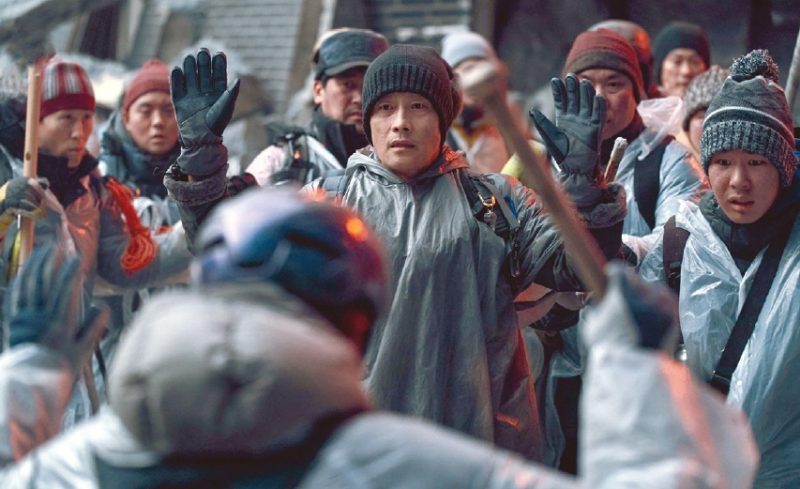
The movie begins with a TV documentary about a towering apartment complex in Seoul. The newscaster reports on how apartments have transformed Korean society. Apartments were once a way to get a bigger house, but now apartments in Korea mean more than just a place to live. It is a desire that is so destructive that it can change the president as apartment property values fluctuate.
‘Concrete Utopia’ is a film that has made an entry for the Best International Feature Film at the 2024 Oscars on behalf of the Korean film industry. It is a dystopian drama that portrays the Korean community’s desire that is symbolized by apartments in the form of a disaster movie while carrying a serious message despite its comical tone. The film’s chances of winning an award at the Academy may hinge on how convincingly it presents South Korea’s pariah capitalism through its portrayal of apartments.
It’s an apocalyptic winter on the Korean peninsula, and humanity is buried in the concrete piles they’ve created. A tsunami of earthquakes strikes, and Seoul stands in ruins. The Han River has dried up, and only one apartment building of the Imperial Palace Apartment complex remains standing.
With the country and its news organizations no longer in existence, dead bodies and debris are all that can be seen. While the residents of Apartment Building 103, including Min-sung (Park Seo-joon) and Myung-hwa (Park Bo-young), wait for rescue, survivors from the outside world flock to the building. Building 103’s residents elect Kim Young-tak (Lee Byung-hun) as their representative and quickly drive the outsiders out. However, they run out of food and face a crisis. The residents become the enemies of all outsiders, labeling everyone outside the Imperial Palace as the enemy.
Their selfish and absurd decisions eventually lead to the collapse of Building 103’s resident community. A society devoid of laws, ethics, and morals, is governed by the laws of the jungle, where only the strongest survive. The residents’ consciousness starts to become bloody.
Amidst the chaos, Myung-hwa emerges as the sole voice of conscience and reason. Suspicious of Kim Young-tak’s ambiguity, she believes that saving people is the moral thing to do, confronting her husband and defending human dignity to the end.
Concrete Utopia deviates a lot from the traditional disaster movie format. Director Um Tae-hwa throws his characters into desperate and frightening scenarios but refrains from making judgments about the morality of their actions. Instead, Um leads the audience to question themselves: “What would I have done?” Only in the final scene does it suggest that Myung-hwa’s rigid beliefs and attitudes are correct.
The wasteland composed of imaginative digital images of savagery and madness and fantastic sets, seems to symbolize the inhumanity of humans. The only people with a hint of humanity are the outsiders sharing boiled potatoes in the outside ruins.
BY JEONG KIM [ckkim22@gmail.com]
The author is a film critic for the Korea Daily.




